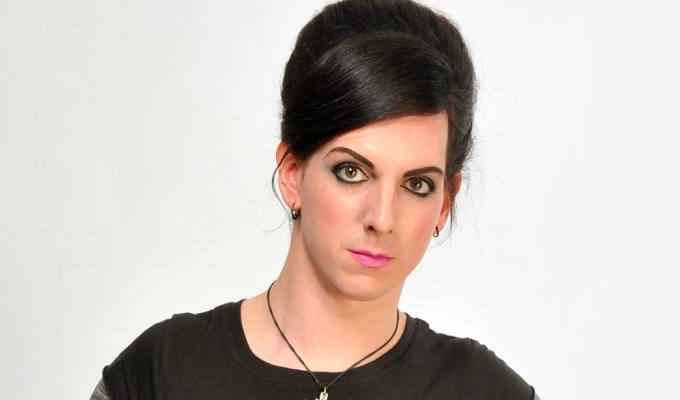
Comedy headliners
Patrick Kielty on C4's new topical show
The publicity material for Channel 4‘s new late-night stand-up show is full of the sort of swaggering adjectives TV folk love to wield. Stand Up For The Week is ‘outrageous’, ‘edgy’, ‘spiky’ and even ‘on the knuckle’, whatever that means.
In fact, it sounds just like the sort of topical comedy show that isn’t supposed to be made any more, in these timid post-Sachsgate times. You can imagine the moral guardians of the mid-market tabloids firing up their word processors already.
That is, if the publicist-generated hype is true.
‘Ignore the press release about it being no-holds barred,’ its host Patrick Kielty says casually. ‘If you say you’re going to be outrageous, the typical reaction is, “Yeah? How fucking outrageous?”. We’re out to be funny, not to shock – but it is Channel 4 and it is 11pm, so that means some of the stuff will go further than Have I Got News For You at 9pm on BBC One.’
Not that he’s unaware that newspapers can fabricate outrage on a whim, should they wish. ‘The easiest thing is to do a transcript of what a comic says without any inflection, delivery, irony or knowingness and put that in print. We are very aware that if that is going to happen, that is going to happen.
‘The audience watching comedians at night are going to react in a different way compared to those who read about it in the morning over their croissants. Most of the audience know that. They’re smart enough to realise reports about “offensive” jokes in the paper are what they are, and the more these stories arise, the more people can see what the press is doing.’
Kielty – who will be re-establishing his credibility as a stand-up rather than a host of ‘shiny floor’ entertainment shows with this series – got caught up in such an ‘outrage’ himself three years ago, when a few members of his stand-up audience in Dublin walked out in protest at jokes about the Madeleine McCann case, causing a small media storm. But the 39-year-old Ulsterman resists the idea that broadcasters, especially the BBC, are cowering in fear of doing anything that might possibly cause offence.
‘A lot has been made of this post-Jonathan Ross, post-Russell Brand climate, but if you watch something like Mock The Week – and I’ve been on it a couple of times – most of the stuff still gets said,’ he asserts. ‘The idea of the BBC as a type of politburo where things can’t be said is a bit of an exaggeration.’
He also takes issue with the received wisdom, most recently repeated by Sir David Frost, that satire in Britain is languishing in the doldrums, compared to a golden era of political comedy in the States.
‘Something like The Daily Show With Jon Stewart has a really small viewership,’ he said. ‘Especially when there’s not an election campaign or a big story like BP. The audience fluctuates, and there is no satire on the mainstream networks there.
‘We’ve got Have I Got News For You and Mock The Week, though we could probably use something on five nights a week.’
But he acknowledges that topical TV comedy shows are ‘hard to pull off’ – something Channel 4 will know only too well, given the critical stings it has received from the likes of Tonightly, The TNT Show and even, back in the day , The 11 O’Clock Show. ‘But Channel 4 are making all the right noises and see stand-up as something they want to be doing,’ Kielty said.
Alumni of these programmes will be regulars on Stand Up For The Week. Jack Whitehall – as seen on the TNT Show and also, more unfortunately, taking drugs in the News Of The World this weekend – is the show’s celebrity correspondent; while the TNT’s Show’s Andi Osho will be reporting on the internet. The regular line-up is completed with Kevin Bridges covering the World Cup, and Rich Hall being his irascible self.
Even the guest stand-up on the try-out episode made, but not aired, last week cut his teeth on the 11 O’Clock Show – Brendon Burns. Kielty says the award-winning comic epitomises the idea of the guest slot: ‘We have an act on at the end that people love on the circuit, but who might not be known to a wider audience,’ he said. Burns clearly impressed the 700-strong audience who packed into North London’s Koko venue for the pilot, as he’ll be closing this Friday’s debut show too.
Stand Up For The Week has its roots more firmly planted in the live scene than similar shows, and Kielty says it aims to catch the immediacy – and even the risk of failure – that makes club stand-up so appealing.
‘Most stand-up on TV is recorded three to four months in advance,’ he said. ‘When you record Live At The Apollo, you know the moment you walk on stage what works. The notion of putting stand-up on the stage reacting to the week is trickier, that’s why producers traditionally resorted to the panel show format because it allows comics to make jokes without the possibility of dying on their arse.
‘What was nice about the warm-up show we recorded last week was that the audience could see that we were doing fresh stuff that we couldn’t rehearse and polish. But with six stand-ups it worked, and everyone got laughs.
‘Plus we offer a number of different voices on the stories of the week: Both Rich Hall and I did something about the Israelis storming the aid ships, for instance, but from completely different angles.’
With a new, still largely bland and faceless, Cabinet, and a vacuum at the top of the Labour party, the consensus is that post-election is not be the best time to be attempting to spear unknown politicians with satire. But again, Kielty graciously begs to differ. ‘We are only one or two shit decision from a wealth of material,’ he says.
And that can surely only be a matter of time...
- Stand Up For The Week starts on Channel 4 at 11.05pm this Friday
Published: 22 Jun 2010






